IOS organises Lecture on “Islamic Research Methodology”
September 20, 2014 at IOS Conference Hall
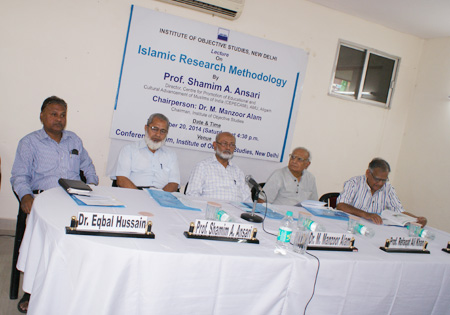
New Delhi, September 20, 2014: The Institute of Objective Studies (IOS), organised a lecture on “Islamic Research Methodology” in its Conference Room here today. Delivering the lecture, the Director, Centre for Promotion of Educational and Cultural Advancement of India (CEPECAMI), Aligarh Muslim University, Prof. Shamim Ahmed Ansari, said that research was an art of scientific knowledge which was careful investigation or enquiry, especially through search for new facts in any branch of knowledge. Explaining Islamic research methodology, he said that it was very much related to the methodology of social sciences research. Islamic research methodology must be Islamic in nature and should focus on social problems. It should begin with exploring the problem and then identifying it. The application of knowledge in the process was important. He contended that a research that failed to benefit society was an exercise in futility.
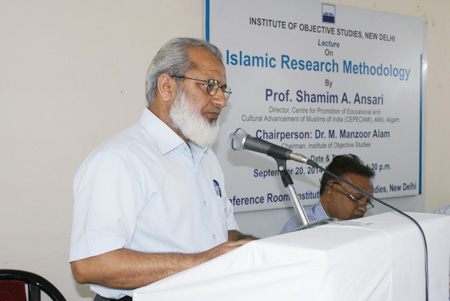
Prof. Ansari insisted that the research methodology kept on changing because of change in the value system with the passage of time. Listing eight steps in conducting research, he held that these research steps were generally undertaken in social sciences in which sometimes new issues were explored. But sometimes there were ex-post facto researches too. In ex-post facto researches, he said, there was no control over the variables as after happening some casual factors were identified. So far as Islamic research methodology was concerned, it was like ex-post facto research, because it was based on revealed knowledge, he noted. Pointing out that our knowledge was limited and incomplete, but revealed knowledge was absolutely perfect and complete, he emphasised that it was necessary to have good knowledge of Islam and only then there could be the quest for developing strategies to help people develop qualities as also the ways of life as demanded by Islam.
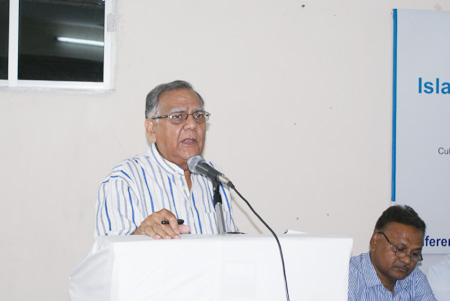
According to Prof. Ansari, the steps for research include defining research problems, reviewing concept and theories, reviewing previous research findings, formulating hypotheses, research design, including sample design, data collection, analysis and testing research hypothesis and interpretation. He informed that good values and qualities were universal and accepted by all religions, adding that Islam, being flexible, demanded attitude and behaviour within the limits of injunctions of the Quran and Hadith. He remarked that Islam used three steps in changing attitude and behaviour with regard to drug addiction. In the first step, he said, taking liquour was regarded a social evil. The second step was a command not to offer prayer in a drunken state and thirdly, when the ground was prepared, consuming liquor was absolutely prohibited. He contended that the strategy offered by Islam for attitude and behaviour was required by the researchers to gauge its efficacy. He insisted that the three-step strategy had been found to be very effective in changing attitude and behaviour. Contrary to this, he maintained, if anyone was forced to accept something or to bring about a change in him, there was every possibility of resistance to change which might reflect in any form at a later stage. In this connection, he cited the example of forceful sterilisation during the Emergency.
Prof. Ansari opined that Islam never favoured a strategy of using force to change individual behaviour. He, however, noted that there was no specific Islamic research methodology. He held that Islam always opted for strategies and methods for behavioral change leading to social change that fitted well with psychological principles.
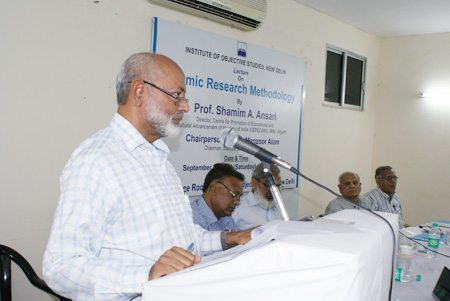
In his presidential remarks, the Chairman of IOS, Dr. Mohammad Manzoor Alam said that Prof. Ansari’s lecture was enlightening for those who were interested in Islamic research methodology. He informed that the IOS had been organising lectures on a variety of subjects that were relevant to Islamic ethos, adding that this would continue in future as well. Comparing the methodology of social sciences research with that of Islamic research, he explained that while the scope of the former was not confined to a particular method, the latter was limited as it was related to the Creator of the Universe and indomitable faith in Him as the only master. He pointed out that the IOS was regularly bringing out the “Journal of Objective Studies” and the “Religion and Law Review” on the pattern of the “American Journal of Islamic Social Sciences”.
Highlighting the activities of the IOS, the Vice-Chairman of the Institute, Prof. Refaqat Ali Khan remarked that the IOS served as a body where intellectuals converged.
He emphatically said that Islamic spirit was still prevalent to guide humanity.
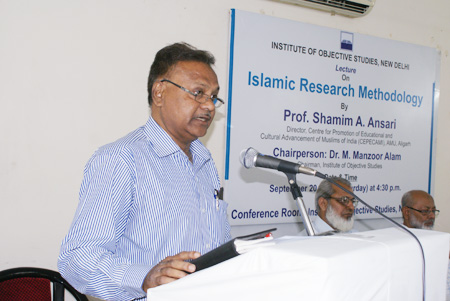
Earlier, the function began with the recitation of a verse from the Holy Qur’an by Hafiz Athar Husain. Associate Prof. of Law, Jamia Millia Islamia, Dr. Eqbal Husain, who introduced the subject, held that the topic assumed importance as it was directly related to society. Moreover, it focused on humanity, he said.
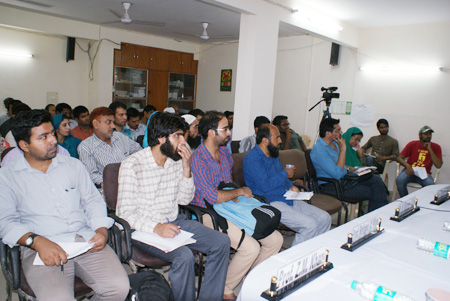
The lecture was attended by several research scholars from Jawaharlal Nehru University and Jamia Millia Islamia, besides a number of intellectuals and journalists. Notable among them were the Secretary General of the IOS, Prof. Z.M. Khan, Messrs. Mahfuz-ur-Rehman, Mohd. Obaidur Rehman, Saleem Ahmed, Anas Mansoor, Saifuddin Kunju, Hisam Al Wahab, Razeem Naushad Jafri, K Khalid Khan, Mrs. Razia Tarannum Bano, Mr. Sadaf, Zubair Hasan Zargar, Modassir Fatah, Md. Munazir Alam, Azharuddin K S, Talha Husain, , Dildar Ahmed, Mohd. Arif Ahmed, Khalid Nadeem Khan, Danish Ahmad Khan and Adeel Akhtar.
Go Back